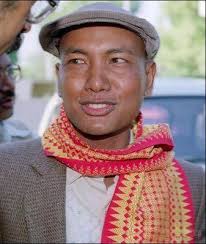Upendra Brahma was born in Boragari village of Dotma, a small township at Kokrajhar district of Assam, India. He was a son of Mr. Monglaram Brahma and Ms. Lefsri Brahma. He was the fifth, and youngest, child. He was called “Thopen” during his childhood. He grew up in poverty.
From 1963, Brahma studied at various schools, including Dotma High School, Kokrajhar High School and, in 1973, at Sakti Ashram High and Vocational School. In 1975, he passed the matriculation examination in the first division. Thereafter he obtained a BSc honours degree in Physics from Cotton College before enrolling at Gauhati University in 1981 for his MSc degree.

Brahma also worked as a graduate science teacher at the Nehru Vocational High School in Gossainichina, and studied for a BA at Kokrajhar College during that period. He obtained his BA in 1985 and his MSc in 1986..He had also been admitted to study law on an LLB course in 1984..
Brahma was elected as the President of the Goalpara District Students Union in 1978–79. He was vice-president of the All Bodo Students Union between 1981–1983 and president from 1986.
Through this body he worked for the education and wellbeing of the community, which he believed to be losing its culture. Under his leadership, the ABSU agreed to include political issues as part of its agenda to give political maturity to the students.
Brahma and his followers gradually mobilized Bodo students at the grass-roots level for education. Brahma, believed that if people will not educate, they will forget to live together in peace and instead of this will start fighting among themselves, which leads to the alternative road of Hate.
Brahma died in Tata Memorial Cancer Hospital in Mumbai on 1 May 1990 as a consequence of blood cancer. His body was taken to Kokrajhar and then buried at Dotoma on 4 May. The ground where Brahma was buried is now known as “Thulungapuri”.
Education is the key to Bodo progress
Brahma believed that everybody needs an aim in life. He had a great plan of action for the Bodos. He realised that only through education, they would be able to get their respect and value. He also desired inclusion of both nationalism and socialism in the curriculum. He also expressed the view that the history of the Bodos should be re-written.
Upendranath Brahma also wanted the development of the villages. He desired that government should establish co-operative societies in the villages. He believed it the proverb, “self help is the best help” and he wished the Bodo people will start to educate themselves and attain the ultimate success in life.
He favoured the introduction of sports as a compulsory subject in the school curriculum. He was of the view that this would help Bodo youths to excel in games and sports.
He also desired the state government to take necessary steps for setting up of new industries in the state. It was not possible to bring economic development of the common people without the development of industries.
He understood that literature is the identity of the community. He was an active writer of poems, short stories and literary articles. He also wrote articles and essays on science. He was also an editor of “BIDANGSRI” from 1977–78. In 1980, he edited “ORKHI”, a news magazine in Bodo from Kokrajhar. Through The Bodoland Times, he tried to reflect the hopes and aspirations of the Bodos.
Brahma desired the state government to take steps for the protection of tribal art and culture. He wanted a Tribal and Backward Communities Culture Preservation Department to be created. He also realised the necessity of a state for the tribals and backward communities.

